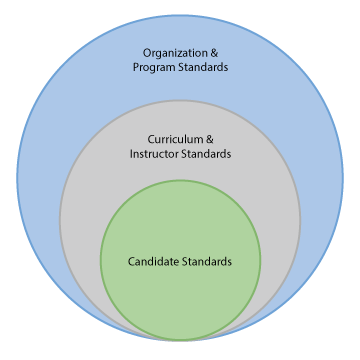ADVERTISEMENT
September 2015
TESOL International Association has a long history of standards development for the field of English language teaching, starting with the first national standards for ESL in the United States published in 1997. In the most recent TESOL Strategic Plan, TESOL’s commitment to advancing the field of English language teaching through quality standards was reemphasized as one the association’s five goals.
Given the diversity of global contexts in which English language teaching takes place, many people starting in the field of teaching English as a second, foreign, or additional language pursue an entry-level credential through various short-term TEFL/TESL (or TESOL or English as an additional language [EAL]) certificate programs (TESOL, 2009a). TESOL’s Standards for Short-Term TEFL/TESL Certificate Programs were created to respond to the proliferation of these certificate programs around the world and to the demand for high quality and accountability in these programs.
Given TESOL’s rich history of standards development in the fields of EFL and ESL, many certificate program administrators, instructors, and students have looked to TESOL to develop these standards. The TESOL board approved the development of short-term TEFL/TESL Certificate Program Standards as well as the creation of the Accreditation Standards Expert Group in 2014.
Scope and Purpose
The Standards for Short-Term TEFL/TESL Certificate Programs are intended for courses of study delivered in English that prepare candidates to teach EFL and ESL to adult, adolescent, or young learners. Whether in a face-to-face, online, or hybrid setting, programs follow a model of interactive instruction as well as an evaluation–feedback process. TESOL research has shown that course hours of short-term certificate programs vary widely among providers, ranging from 20 to 250 hours. These standards are intended for programs that are 120 to 180 interactive hours in length and that include
The Standards for Short-Term TEFL/TESL Certificate Programs are relevant to any short-term certificate TEFL/TESL program regardless of the learning platform (e.g., face-to-face, virtual learning, or hybrid model). However, TESOL understands that programs operating within a virtual learning environment will need both creativity and flexibility in meeting some of the standards (e.g., how the practicum is conducted). Similarly, virtual learning or hybrid programs will need to account for their instructional hours differently than face-to-face programs.
TESOL recognizes that TEFL/TESL short-term certificate programs vary greatly around the world and that each organization must respond to the specific needs of its students and their communities. For this reason, the Standards for Short-Term TEFL/TESL Certificate Programs are built to be prescriptive in areas that are vital to the maintenance of a successful program as well as flexible in some areas to meet the needs of the populations being served. The standards are intended to provide a framework for organizations to use in developing, implementing, and evaluating short-term TEFL/TESL training programs.
Organization of Standards
The Standards for Short-Term TEFL/TESL Certificate Programs are divided into three strands of standards:
The Organization and Program Management Standards provide guidelines for managing TEFL/TESL certificate programs, including hiring instructors. The Curriculum and Instructor Standards provide guidelines to programs for developing or selecting a curriculum and procedures for providing instruction. The Candidate Standards describe what candidates should know and be able to do upon completing the training program.
The Candidate Standards form the core of the standards in that they represent the ultimate goal of the program, which is to support candidates in becoming ESL/EFL teachers. However, the Organization and Program Management Standards and the Curriculum and Instructor Standards are essential in that they provide an administrative framework for the program. Those two strands of standards ensure that the Candidate Standards are likely to be met and that the candidates receive the instruction and services to reach their goals and the goals of the program. The Organization and Program Management Standards as well as the Curriculum and Instructor Standards also ensure that the Candidate Standards remain relevant and effective over time. Figure 1 illustrates the relationships among the Organization and Program Management Standards, the Curriculum and Instructor Standards, and the Candidate Standards.

Figure 1. Relationship Among Organization and Program Management Standards, Curriculum and Instructor Standards, and Candidate Standards
See an overview of the Standards for Short-Term TEFL/TESL Certificate Programs on TESOL’s website. The standards will be available for purchase on 14 September 2015.
| Next Article |
ESL Lecturer, Northeastern University, Boston, Massachusetts, USA
Online English Coach, 100e.com, Worldwide
Want to post your open positions to Job Link? Click here.
To browse all of TESOL's job postings, check out the TESOL Career Center.